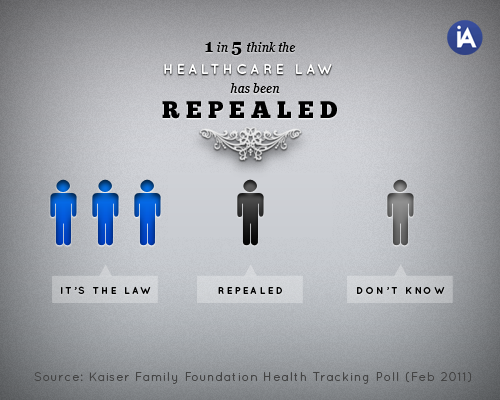A February 2011 survey of more than 1,200 adults conducted by the Kaiser Family Foundation found that roughly half of Americans believe that the Patient Protection and Affordable Care Act has been repealed. Twenty-two percent (22%) of those polled believe the law is no longer in effect. Another twenty-six percent (26%) weren’t sure or refused to answer—in other words: they didn’t know.
The blatant confusion swirling around the status of a major piece of federal legislation is understandable, even if not entirely defensible. Factors like the largely symbolic repeal vote in the US House, various states’ legal challenges—currently at a 2-2 draw—to the constitutionality of the individual mandate to obtain coverage, and a long implementation horizon for the bill’s major provisions have unsurprisingly put a lot of people at sixes and sevens on the issue.
But.
But so much information—so much clear and factual information—exists on the real status of the law, that it gives one pause to think that half the country has no clue what’s going on regarding the law of the land.
This, to me, raises an interesting question about the “least sophisticated consumer” standard so often applied to the FDCPA. In the financial services space, I think it’s safe to assert that most consumers grasp the fairly simple single (or at most “dual”) payer structure involved in buying a flat screen TV on a Visa card—even if not all of those consumers ultimately fulfill their financial obligations. In the healthcare industry, the dizzying blend of multiple payers alone is enough to forewarn that hospitals, clinics, billing companies, insurers, and accounts receivable and revenue cycle management companies face an uphill battle in collecting delinquent patient accounts, much less educating consumers on the concept of “patient responsibility.”
 The fundamental charge of US healthcare providers may be to prevent and cure disease. In light of the Kaiser poll, the underlying challenge for their outsourced business services partners in the ARM industry may be to treat the symptoms of ignorance.
The fundamental charge of US healthcare providers may be to prevent and cure disease. In light of the Kaiser poll, the underlying challenge for their outsourced business services partners in the ARM industry may be to treat the symptoms of ignorance.
Michael Klozotsky is the managing editor of insideARM.com and can filibuster with the best of them. He can be reached by email.





![[Image by creator from ]](/media/images/2015-04-cpf-report-training-key-component-of-s.max-80x80_F7Jisej.png)


![Report cover reads One Conversation Multiple Channels AI-powered Multichannel Outreach from Skit.ai [Image by creator from ]](/media/images/Skit.ai_Landing_Page__Whitepaper_.max-80x80.png)
![Report cover reads Bad Debt Rising New ebook Finvi [Image by creator from ]](/media/images/Finvi_Bad_Debt_Rising_WP.max-80x80.png)
![Report cover reads Seizing the Opportunity in Uncertain Times: The Third-Party Collections Industry in 2023 by TransUnion, prepared by datos insights [Image by creator from ]](/media/images/TU_Survey_Report_12-23_Cover.max-80x80.png)
![[Image by creator from ]](/media/images/Skit_Banner_.max-80x80.jpg)
![Whitepaper cover reads: Navigating Collections Licensing: How to Reduce Financial, Legal, and Regulatory Exposure w/ Cornerstone company logo [Image by creator from ]](/media/images/Navigating_Collections_Licensing_How_to_Reduce.max-80x80.png)
![Whitepaper cover text reads: A New Kind of Collections Strategy: Empowering Lenders Amid a Shifting Economic Landscape [Image by creator from ]](/media/images/January_White_Paper_Cover_7-23.max-80x80.png)